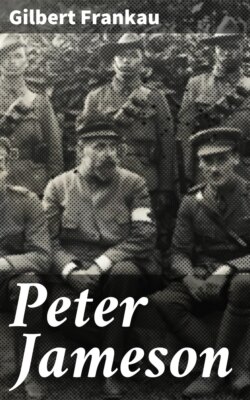Читать книгу Peter Jameson - Gilbert Frankau - Страница 20
На сайте Литреса книга снята с продажи.
§ 4
ОглавлениеTable of Contents
Reid, Chatterton and Reid, Chartered Accountants, inhabited a cold gloomy office on the fourth floor of Great Winchester House—an office by no means in keeping with their status as one of the premier auditing firms in the City. George Reid himself—a deliberate-looking middle-aged man of University education, square-chinned, clean-shaven, lined of face but twinkling of eye—welcomed Peter; led him into the “board-room”—a shabby apartment furnished with twelve wood-seated chairs, an enormous table and a rather gimcrack sofa.
“The others haven’t arrived yet. Have some tea?”
“Thanks,” said Peter. “Tell me,” he went on, after the two cups had been brought, “has Turkovitch been to see you?”
“Unofficially,” grinned Reid. “Yes. What have you been doing to the little man? He’s in a rare stew. Says he wishes he could get his money out.”
“He can,” said Peter laconically. “I’m about through with friend Ivan. It isn’t that I grudge him the eventual profits. But the chap’s no good for a show like this. He hasn’t got the spunk.”
“Well, don’t lose your temper with him this afternoon,” warned Reid, who knew Peter of old. “By the way, how’s Jameson’s getting on these days? You really ought to have their accounts audited, you know.”
“Simpson won’t. He’s very old-fashioned; says he can’t stand outsiders prying into his affairs.”
Bramson and Turkovitch came in, shook hands, sat down. Reid opened the “minute-book,” gabbled off the minutes of the last meeting which Peter signed perfunctorily. (Nirvana was a private company, the requisite number of shareholders being made up by clerks.)
“And now,” began Reid, “for the accounts. As far as I can see—there are one or two adjustments still to be made—we have managed, for the first time, to pay all our expenses and earn a small dividend.”
“Do ve pay out de dividend?” asked Turkovitch.
“Of course we don’t,” snapped Peter, “the money’s wanted for expansion.”
“Den vot’s the good of making it?” growled Turkovitch.
“One moment, gentlemen,” went on Reid. “I find, on careful analysis of the figures, that—had it not been for the high profits earned on the export trade—we should have made, not a profit, but a loss.” He gave details, and concluded, “I don’t think that’s a sound position.”
“Nor I,” commented Peter.
But here Turkovitch—tact thrown to the winds—boiled over. It was his business; his name was on all the brands; he knew quite well what “Petere” wanted; “Petere” wanted to be a millionaire; “Petere” wished to spend all the profit in some crazy scheme of advertising; why should they advertise? the cigarettes were the finest cigarettes in the world; he, Turkovitch, guaranteed them. …
“Oh, shut up,” muttered Peter, exasperated.
“I vill not shut up. You are always interfering. You interfere with me and de vork-peoples. You interfere vith my tobacco merchants. And now you vant to interfere vith de dividends.”
“Damn it, you draw a salary of seven hundred a year; and I haven’t had a penny piece out of the concern yet.”
Turkovitch became plaintive, even less intelligible than usual. “But vy not pay out de dividend? A leetle dividend. Drei per cent on de cabital.”
“Because, there’s no money to do it with: because we’re trading on bank-credit: because. … Oh, you try and explain things to him, Reid,” said our Mr. Jameson hopelessly.
Reid plunged into an exhaustive bath of facts and figures. There was big money to be made out of Nirvana. Reid knew it; Peter knew it; Bramson knew it. The hopeless period of an advertising business, the pay-pay-pay-and-not-a-jitney-of-it-back stage had been passed. Now, all they needed was work, a little more capital, and—supremely—confidence. But the Hungarian didn’t, couldn’t, wouldn’t see it.
“Dis is not business, eet is gambling,” he kept on saying. “You spend and you spend. And dere are no deevidends. I vish I had my cabital out of de gompany. …”
Reid glanced at Peter, who took the cue, screwed the butt of his cigar into the corner of his mouth, and said, very slowly:
“Look here, Turkovitch. You’re being a frightful ass. I don’t like to see any man who has worked with me throwing away a fortune. …”
“Fortune?” sniffed Turkovitch. “Vith no deevidends.”
“Do let me speak for a minute. As I was saying, you’re being very foolish. But if you really mean what you say, you shall have your capital out. I’ll buy your shares off you. At a fair price.”
“Vot price?”
Peter, who had devoted the week-end (Poor Patricia!) to a careful study of the anticipated problem, drew a piece of paper from his pocket.
“When I first consented to join you in this show,” he began, “you were worth, at an outside estimate, two thousand pounds. For six years, you’ve been drawing £700 a year.”
“Dat,” said Turkovitch, slightly mollified already, “vos for my vork, for my experience.”
“Quite right. I wasn’t asking you to give it me back, was I? Then there’s six years’ compound interest at, say, five per cent. Call it two thousand eight hundred. I’ll give you”—Peter hesitated for a moment, went up two hundred in his mind—“Three thousand pounds for your shares in Nirvana. The lot, of course.”
And so—after about a fortnight of negotiation—they got rid of the obstructionist. He went, in the end, quietly; delighted with his cheque; saying: “Now, I and my wife, ve take a little trip to Salonica. Perhaps, ven I come back, ve do some business in de leaf-tobacco, eh, Petere?”
“Right you are,” said our Mr. Jameson, who had no patience with fools but never bore malice.
